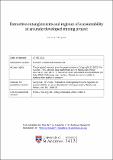Files in this item
Extractive entanglements and regimes of accountability at an undeveloped mining project
Item metadata
| dc.contributor.author | Skrzypek, Emilia E. | |
| dc.date.accessioned | 2021-05-17T16:30:06Z | |
| dc.date.available | 2021-05-17T16:30:06Z | |
| dc.date.issued | 2020-12 | |
| dc.identifier | 269804450 | |
| dc.identifier | 193ea3b5-bc3e-40c0-ae28-3b8a399159a5 | |
| dc.identifier | 85089595834 | |
| dc.identifier | 000600783300014 | |
| dc.identifier.citation | Skrzypek , E E 2020 , ' Extractive entanglements and regimes of accountability at an undeveloped mining project ' , Resources Policy , vol. 69 , 101815 . https://doi.org/10.1016/j.resourpol.2020.101815 | en |
| dc.identifier.issn | 0301-4207 | |
| dc.identifier.other | RIS: urn:88CAC08E854BAF3E2F8D43E47E93B18B | |
| dc.identifier.other | ORCID: /0000-0001-6357-0180/work/79564845 | |
| dc.identifier.uri | https://hdl.handle.net/10023/23210 | |
| dc.description | This project has received funding from the Economic and Social Research Council UK [award number ES/1904107/1]; and the European Union's Horizon 2020 research and innovation programme under the Marie Sklodowska-Curie grant agreement No 753272. | en |
| dc.description.abstract | This paper uses a case study of Community Relations and Development (CRD) field practitioners at the Frieda River Project – an advanced copper and gold exploration venture in the upper Sepik region of Papua New Guinea – to contrast the professional arenas in which corporate social responsibility (CSR) mechanisms tend to be strategically developed, and the deeply relational contexts in which they are implemented on the ground, in the project location. It provides insights into experiences of site-level CRD personnel tasked with implementation of community relations and development programmes, and offers an audit of their perceptions regarding their role and the value they bring to the design of complex orebody projects. The article explores the role of ‘CSR’ and ‘sustainable development’ in the framing of the company's engagement with local stakeholders – assessed from the perspective of CRD officers. Contextualising research material within debates about CSR in the resource extraction industry, the paper shows that while the discourse of CSR was ultimately born out of acknowledgements of companies' entanglements in their wider operating environments, its mechanisms can be used to promote the ethics of detachment, and may serve to distance companies from the complexities of the environments in which they operate. | |
| dc.format.extent | 9 | |
| dc.format.extent | 595693 | |
| dc.language.iso | eng | |
| dc.relation.ispartof | Resources Policy | en |
| dc.subject | Copper | en |
| dc.subject | Papua New Guinea | en |
| dc.subject | Corporate social responsibility | en |
| dc.subject | Community relations and development | en |
| dc.subject | Mineral governance | en |
| dc.subject | GN Anthropology | en |
| dc.subject | T-NDAS | en |
| dc.subject | SDG 12 - Responsible Consumption and Production | en |
| dc.subject.lcc | GN | en |
| dc.title | Extractive entanglements and regimes of accountability at an undeveloped mining project | en |
| dc.type | Journal article | en |
| dc.contributor.sponsor | European Commission | en |
| dc.contributor.institution | University of St Andrews. Social Anthropology | en |
| dc.identifier.doi | https://doi.org/10.1016/j.resourpol.2020.101815 | |
| dc.description.status | Peer reviewed | en |
| dc.identifier.grantnumber | 753272 | en |
This item appears in the following Collection(s)
Items in the St Andrews Research Repository are protected by copyright, with all rights reserved, unless otherwise indicated.

